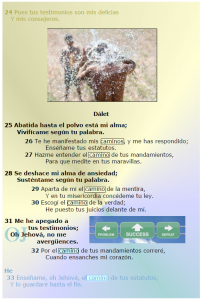 The Daleth passage has a tighter structure than many of the other sections of Psalm 119, though that structure may not be immediately obvious. Three of the verses (25, 28, 31) have the psalmist speaking from great affliction; two of these verses use the verb “cling.” The other five verses share in common the word “way” or “ways” (though the NKJV translates the same Hebrew word as “course” in verse 32). In verses 26-27, “my ways” are compared to “the ways of your precepts”; verses 29-30 compares the way of lying with the way of truth.
The Daleth passage has a tighter structure than many of the other sections of Psalm 119, though that structure may not be immediately obvious. Three of the verses (25, 28, 31) have the psalmist speaking from great affliction; two of these verses use the verb “cling.” The other five verses share in common the word “way” or “ways” (though the NKJV translates the same Hebrew word as “course” in verse 32). In verses 26-27, “my ways” are compared to “the ways of your precepts”; verses 29-30 compares the way of lying with the way of truth.
As it happens, the repetition of those words is structural as well as thematic, the result of what Alexander Maclaren calls “the exigencies of the acrostic plan.” That is, the Hebrew words for “way” and “cling” each begin with the letter Daleth, and in the original text they are the first words of the verses in which they occur.
The “cling” of verse 25 and that of verse 31 are used to very different effects. The former has the psalmist glued to the dust; the latter reflects the one and only hope for such despair–refusing to let God’s testimonies slip from your grasp. “Cling” is an especially appropriate English verb for the context, given its connection with refuge or rescue. Think about the things that one clings to in English: a child clings to his mothers skirts or to her neck; we cling to a lifeline (literally) or to a slim hope (figuratively). The Hebrew verb used here is the same one translated “hold fast to” (ESV) or “cleave unto” (KJV) in Genesis 2:24: “Therefore a man shall leave his father and his mother and hold fast to his wife, and they shall become one flesh.” The psalmist’s intention is to hold as tightly to his God.
As a long time “Peanuts” fan, it occurs to me that Pigpen would be a good illustration for the “cling” of verse 25, while Linus and his security blanket fit the “cling” of verse 31.
The heartfelt “Revive me!” of the psalmist is a recurring plea in Psalm 119. It appears first in verse 25 and is repeated eight more times in the psalm.
What a blessing to be able to tell God, “I have chosen the way of truth”! As much as any other, this verse motivates me to encourage my children to memorize Psalm 119. I have seen so many friends bring so much needless suffering on themselves–yes, and at times I’ve done the same–by willfully refusing to let their steps be directed by God’s judgments in one area or another in their lives. As I work with my son to memorize Psalm 119, my prayer for him is that these words would be engraved on his heart and mind, that when he’s tempted to go astray they would run through his head like a song and prompt him to stay the course. And I pray, too, that when he steps off that course, these words would help him recognize the reason for the sudden emptiness he feels, and bring him back to the path of blessing.
There’s a lot of the “walk” of the believer in Psalm 119, a lot of faithful, consistent plodding along; only in verse 32 do we see this pilgrim run. I find this a tremendously appealing thought. I love to run, and know well the feeling of health and freedom it provides on those rare days when I feel strong and my legs are especially mile-hungry.
Healthy legs are important to a runner, but of course his best asset is a healthy heart. I may be taking the passage more literally than necessary, but “you shall enlarge my heart” always makes me think of the racehorse Secretariat. Only after Secretariat’s death was the cause of his greatness revealed: his heart was nearly three times the size of that of an average horse. “Increase my capacity to run, Lord, and I will finish the course.”
Verse 32 is a beautiful end to the passage, a high note–the man who was stuck in the dust one day is disappearing in a cloud of it the next, traveling God’s road seemingly without effort, renewed, refreshed, revived. This thanks to God, through whom we can “run and not be weary” (Is. 40:31).
Notes on memorization, Ps. 119:25-32
I don’t know if it’s the rhythm or the alliteration or the image, but I’ve never had a problem remembering verse 32. For some reason, though, verses 26 and 27 have always been–and still are–hard for me to recall. Why? I don’t know. If you find them equally un-memorable, perhaps concentrating more on them right from the beginning will help you get learn them better than I have been able to so far.
Every time you recite verse 32, try to remember to quote at least the first line of verse 33 as well. That will create a link in your mind that will always help you move easily into the next passage. You’ll notice that “way” occurs in verse 33, too, which also helps link the two sections.
